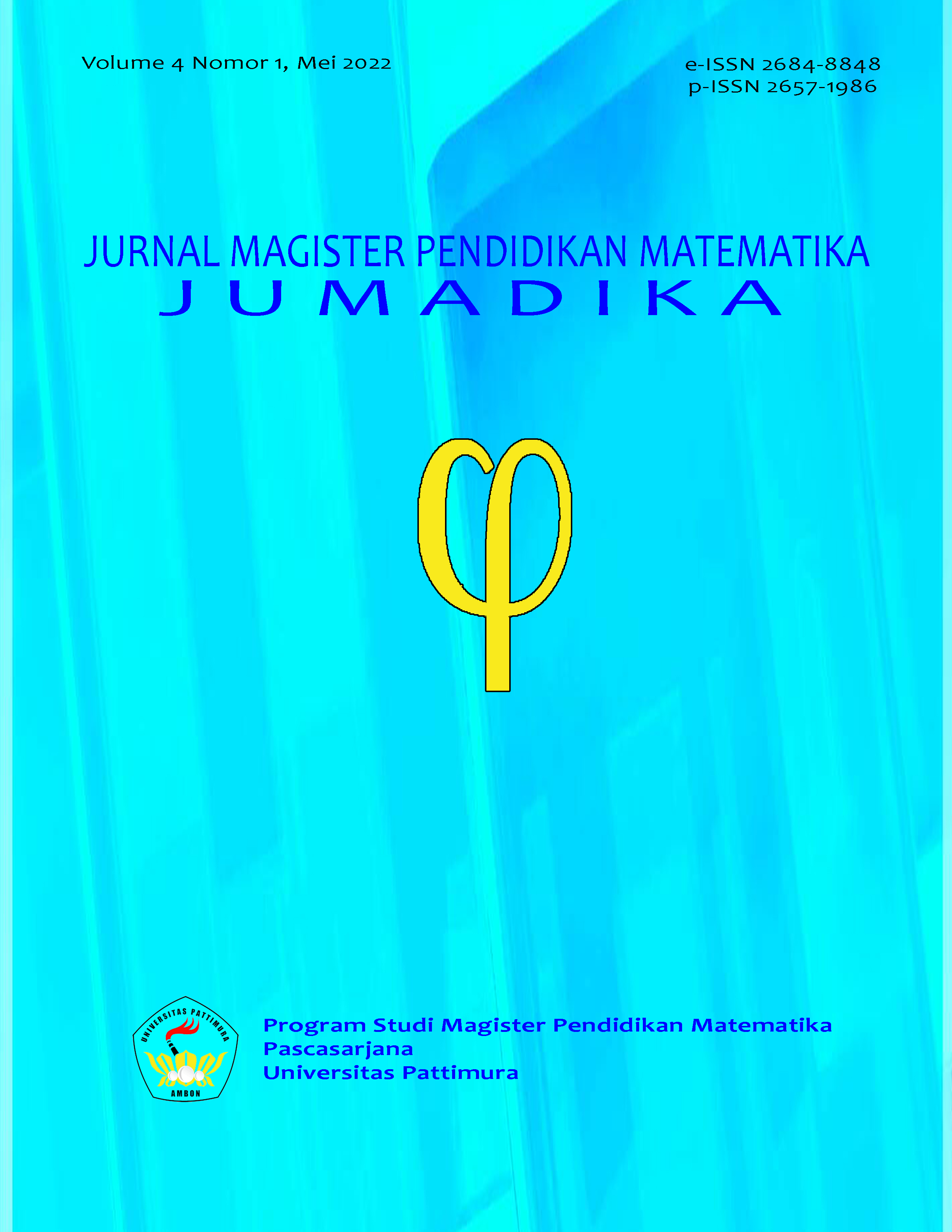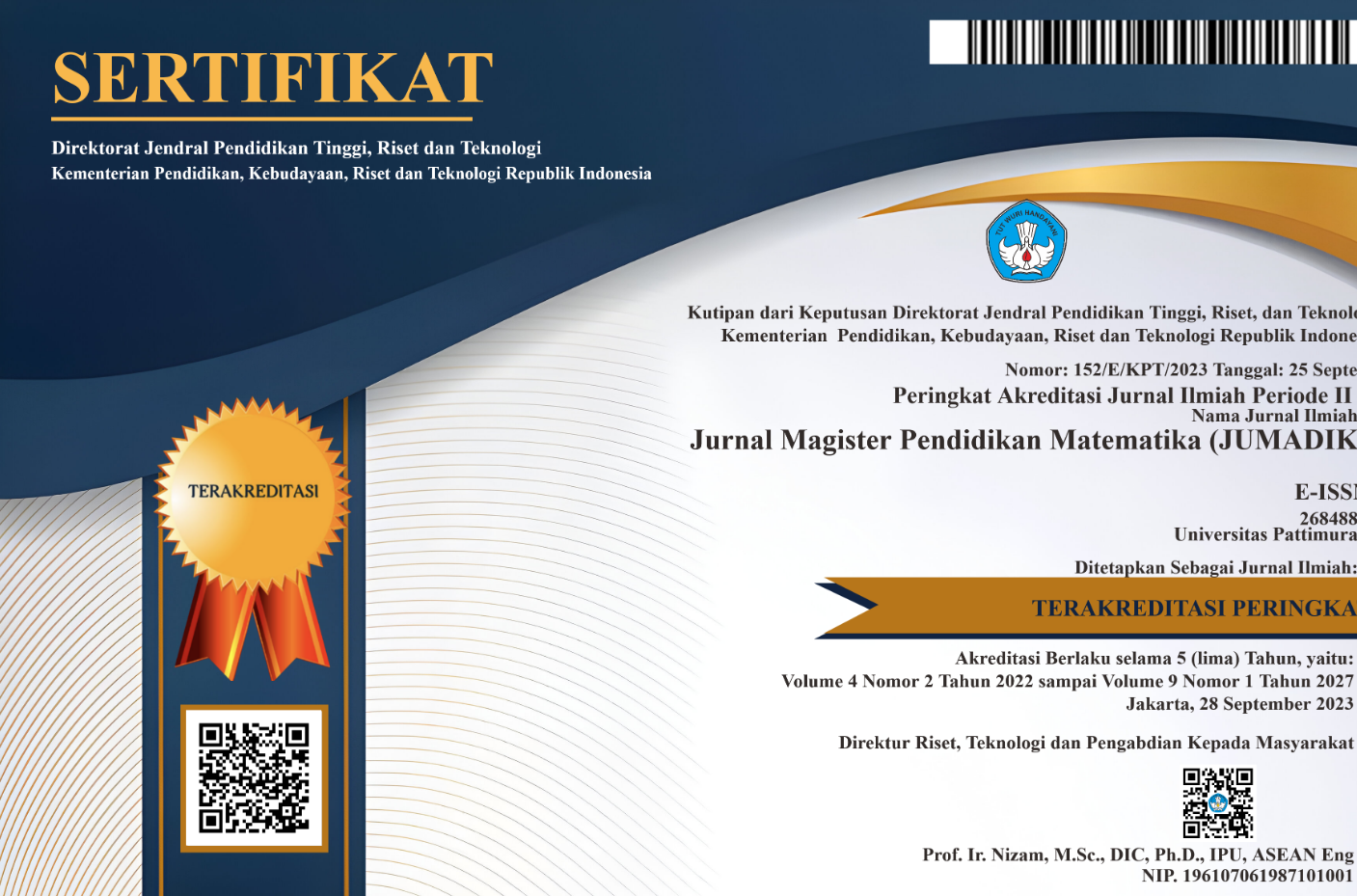SELF CONFIDENCE SISWA DALAM MEMECAHKAN SOAL SERUPA PISA BERKONTEN CHANGES AND RELATIONSHIPS
Abstract
The purpose of the study was to determine student’s self confidence in solving problems similar to PISA with the content of change and relationship and the selected material, namely SPLDV. This research is a qualitative descriptive. The population of this research was class VIII MTs NU Nurul Huda with a sample of class VIII-B consisting of 34 students. Data collection in this research includes observations, questionnaires, written tests, interviews and documentation. The data analysis process including data reduction activities, data presentation and data collection using triangulation techniques. The results of this study indicate that students who have high self confidence have the ability to solve problems similar to PISA more than students who have moderate or low self confidence. Students who have moderate self confidence have the ability to solve problems similar to PISA more than students who have low self confidence.
Downloads
References
Antipolo, J. (2021). Game-Based Learning: Learn Math While You Play With It. Academia Letters, October, 1–4.
Anwar, R. B., & Rahmawati, D. (2017). Symbolic and Verbal Representation Process of Student in Solving Mathematics Problem Based Polya’s Stages. International Education Studies, 10(10), 20.
Charmila, N., Zulkardi, Z., & Darmawijoyo, D. (2016). Pengembangan soal matematika model PISA menggunakan Konteks Jambi. Jurnal Penelitian Dan Evaluasi Pendidikan, 20(2), 198–207.
Edison. (2015). Peningkatan Kemampuan Pemahaman Matematis Dan Self Confidence Siswa Melalui Pengembangan Kooperatif Tipe Group Investigation di SD (pp. 30–42). Universitas Pendidikan Indonesia.
Ferdianto, F., & Yesino, L. (2019). Analisis Kesalahan Siswa dalam Menyelesaikan Soal Pada Materi SPLDV Ditinjau dari Indikator Kemampuan Matematis. SJME (Supremum Journal of Mathematics Education), 3(1), 35.
Khairiah, Wati, M., & Hartini, S. (2015). Hubungan Kepercayaan Diri Dengan Hasil Belajar Siswa Kelas VIII MTs N Mulawarman Banjarmasin Pada Mata Pelajaran IPA. Berkala Ilmiah Pendidikan Fisika, 3(3), 200–210.
Kohar, A. W., Zulkardi, & Darmawijoyo. (2014). Developing PISA- like Mathematics Tasks to Promote Students ’ Mathematical Literacy. Proceeding the 2nd SEA-DR, 978, 14–26.
Murtiyasa, B., Rejeki, S., & Setyaningsih, R. (2018). PISA-Like Problems Using Indonesian Contexts. Journal of Physics: Conference Series, 1040(1).
OECD. (2014). PISA 2012 Results: What Students Know and Can Do Student Performance In Matheatics Reading and Science (Volume I): Vol. I.
OECD. (2017). PISA 2015 Assessment and Analytical Framework: Science, Reading, Mathematic, Financial Literacy and Collaborative Problem Solving, revised edition. In OECD Publishing.
OECD. (2018). PISA 2015 Result in Focus (p. 5).
Özcan, Z. Ç., İmamoğlu, Y., & Bayraklı, V. K. (2017). Analysis Of Sixth Grade Students’ Think-Aloud Processes While Solving A Non-Routine Mathematical Problem. Educational Sciences: Theory & Practic, 17(1), 129–144.
Peranginangin, S. A. (2017). An Analysis of Students’ Mathematics Problem Solving Ability in VII Grade at International Journal of Sciences : An Analysis of Students ’ Mathematics Problem Solving Ability in VII Grade at SMP Negeri 4 Pancurbatu. International Journal of Basic and Applied Research, 33(June), 57–67.
Pulungan, R. R., & Suhendra. (2019). Analysis Of Student’s Misconception In Solving System Of Linear Equation In Two Variables. Journal of Physics: Conference Series, 1157(4), 2–8.
Putra, H. D., Putri, W. A. S., Fitriana, U., & Andayani, F. (2018). Kemampuan Pemecahan Masalah Matematis dan Self-Confidence Siswa. SJME (Supremum Journal of Mathematics Education), 2(1), 60–70.
Putri, R. I. I., & Fitra, D. (2018). Soal Serupa PISA Menggunakan Konteks Cabang Olahraga Lari. Jurnal Inovasi Edukasi, 1(1).
Rabbani, S., & Tatang, H. (2017). Increasing Formulate And Test Conjecture Math Competence And Self Confidence In Using The Discovery Learning Teaching Math. Journal of Elementary Education, 1(1), 119–128.
Ramdan, Z. M., Veralita, L., Rohaeti, E. E., & Purwasih, R. (2018). Analisis Self Confidence Terhadap Kemampuan Pemecahan Masalah Matematis Siswa SMK Pada Materi Barisan dan Deret. Jurnal Pendidikan Matematika FKIP Universitas Muhammadiyah Metro, 7(2), 171–179.
Shah, N. H. (2020). Analyses of Life Skills Development Practices in Secondary Schools of Islamabad. Global Social Sciences Review (GSSR), 5(2), 115–125.
Sugiono. (2016). Metode Penelitian Pendidikan Pendekatan Kuantitatif, Kualitatif, dan R&D. Alfabeta.
Waini, I., Hamzah, K., Mohd, R., Hamizah, N., & Amira, N. (2014). Self-Confidence in Mathematics: A Case Study on Engineering Technology Students in FTK. International Journal For Innovation Education and Research (IJIER), 2, 10–13.
Copyright (c) 2022 Hanik Khasmawati, St Budi Waluya, Mohammad Asikin

This work is licensed under a Creative Commons Attribution-NonCommercial-ShareAlike 4.0 International License.
License and Copyright Agreement
In submitting the manuscript to the journal, the authors certify that:
- They are authorized by their co-authors to enter into these arrangements.
- The work described has not been formally published before, except in the form of an abstract or as part of a published lecture, review, thesis, or overlay journal. Please also carefully read Jurnal Magister Pendidikan Matematika (JUMADIKA) Posting Your Article Policy.
- That it is not under consideration for publication elsewhere,
- That its publication has been approved by all the author(s) and by the responsible authorities – tacitly or explicitly – of the institutes where the work has been carried out.
- They secure the right to reproduce any material that has already been published or copyrighted elsewhere.
- They agree to the following license and copyright agreement.
Copyright
Authors who publish with Jurnal Magister Pendidikan Matematika (JUMADIKA) agree to the following terms:
- Authors retain copyright and grant the journal right of first publication with the work simultaneously licensed under a Creative Commons Attribution-NonCommercial-ShareAlike 4.0 International License (http://creativecommons.org/licenses/by-nc-sa/4.0/) that allows others to share the work with an acknowledgment of the work's authorship and initial publication in this journal.
- Authors are able to enter into separate, additional contractual arrangements for the non-exclusive distribution of the journal's published version of the work (e.g., post it to an institutional repository or publish it in a book), with an acknowledgment of its initial publication in this journal.
- Authors are permitted and encouraged to post their work online (e.g., in institutional repositories or on their website) prior to and during the submission process, as it can lead to productive exchanges, as well as earlier and greater citation of published work.








